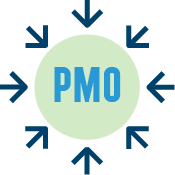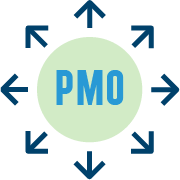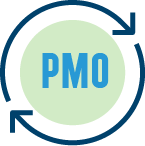Is your Project Management Office (PMO) effectively implementing your business strategy? No matter your project management needs, we are here to provide expert assistance and fast-moving solutions. Whether you require assistance in initiating and planning complex projects, comprehensive support throughout the project life cycle, red project recovery services, or executive mentoring, our team has the expertise and agility to help you succeed.

Experience our Experience

Planning for the Unplanned
PM & PMO Solutions
-

Formation of the PMO. The initial step involves establishing the PMO by identifying its purpose, objectives, and scope. This includes defining the PMO's organizational structure, roles and responsibilities, and the alignment of its functions with the overall strategic goals of the organization. The formation stage requires conducting stakeholder analysis, gaining executive support, and developing a robust business case for the PMO's implementation.
-

Deployment of the PMO. Once the PMO's structure and purpose are defined, the deployment phase focuses on implementing the PMO within the organization. This stage entails designing and implementing relevant processes, methodologies, and frameworks for project management. It involves identifying and tailoring project management practices, establishing governance mechanisms, and integrating the PMO into the existing organizational structure. Adequate training and communication plans are essential to ensure a smooth transition and widespread adoption of the PMO.
-

Operations of the PMO. During the operations phase, the PMO assumes its day-to-day responsibilities, playing a central role in project oversight and coordination. This stage involves providing project management support, enforcing project standards, and facilitating collaboration among project teams. The PMO monitors project progress, manages risks and issues, and ensures the timely delivery of projects within scope, budget, and quality expectations. It also fosters knowledge sharing and continuous improvement by capturing lessons learned and promoting best practices across projects.
-

Enhancement of the PMO. To ensure the PMO's long-term success and continuous value creation, enhancement efforts are vital. This stage focuses on measuring the PMO's performance through key performance indicators (KPIs) and conducting regular assessments and audits. Based on these evaluations, the PMO identifies areas for improvement and implements necessary changes to enhance its effectiveness. This phase may involve refining processes, updating methodologies, incorporating new technologies, and adapting to evolving organizational needs and industry trends.
-

Formation of the PMO. The initial step involves establishing the PMO by identifying its purpose, objectives, and scope. This includes defining the PMO's organizational structure, roles and responsibilities, and the alignment of its functions with the overall strategic goals of the organization. The formation stage requires conducting stakeholder analysis, gaining executive support, and developing a robust business case for the PMO's implementation.
-

Deployment of the PMO. Once the PMO's structure and purpose are defined, the deployment phase focuses on implementing the PMO within the organization. This stage entails designing and implementing relevant processes, methodologies, and frameworks for project management. It involves identifying and tailoring project management practices, establishing governance mechanisms, and integrating the PMO into the existing organizational structure. Adequate training and communication plans are essential to ensure a smooth transition and widespread adoption of the PMO.
-

Operations of the PMO. During the operations phase, the PMO assumes its day-to-day responsibilities, playing a central role in project oversight and coordination. This stage involves providing project management support, enforcing project standards, and facilitating collaboration among project teams. The PMO monitors project progress, manages risks and issues, and ensures the timely delivery of projects within scope, budget, and quality expectations. It also fosters knowledge sharing and continuous improvement by capturing lessons learned and promoting best practices across projects.
-

Enhancement of the PMO. To ensure the PMO's long-term success and continuous value creation, enhancement efforts are vital. This stage focuses on measuring the PMO's performance through key performance indicators (KPIs) and conducting regular assessments and audits. Based on these evaluations, the PMO identifies areas for improvement and implements necessary changes to enhance its effectiveness. This phase may involve refining processes, updating methodologies, incorporating new technologies, and adapting to evolving organizational needs and industry trends.





